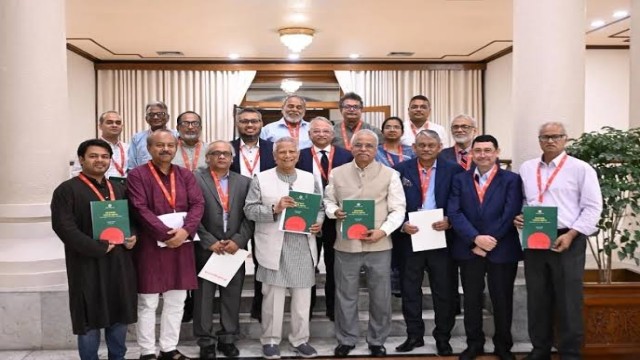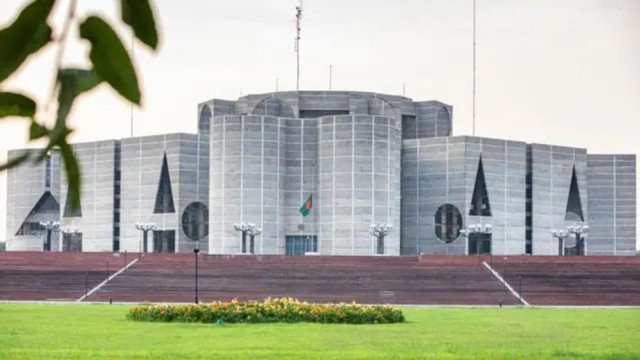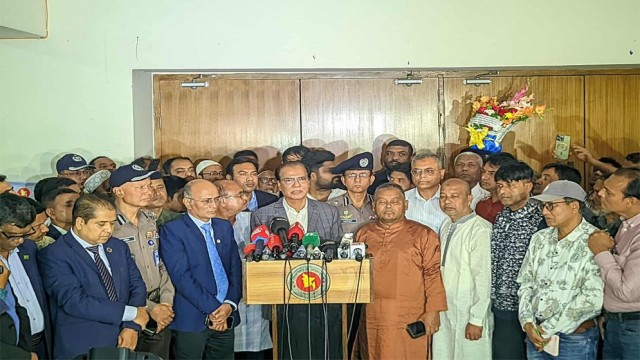DHAKA, Apr 25 (V7N) - In a move poised to reshape the landscape of labour rights and industrial practices in Bangladesh, the Labour Reform Commission has unveiled a series of groundbreaking recommendations aimed at bolstering transparency, ensuring financial security, and strengthening the social safety net for the nation's vast workforce.
The commission's report, submitted to Chief Adviser Professor Muhammad Yunus, signals a significant stride towards creating a more equitable and accountable industrial environment. A key proposal mandates factory owners to submit wage payment information online to the Department of Inspection for Factories and Establishments (DIFE) on a monthly basis. This move is expected to enhance transparency and facilitate more effective monitoring, potentially curbing instances of delayed or unfair wage disbursement.
Recognizing the financial vulnerabilities faced by both employers and employees, the commission has advocated for the provision of bank overdraft facilities and the establishment of a compulsory contingency fund equivalent to three months' salary. This proactive measure aims to ensure business continuity and protect workers' livelihoods during unforeseen economic headwinds. Furthermore, a crucial amendment to the Bankruptcy Act has been suggested, prioritizing the payment of workers' outstanding dues in the event of an entity's insolvency – a vital safeguard for those most at risk.
In an innovative approach to address potential crises in the crucial export-oriented industries, the commission has proposed the creation of an emergency fund. This fund, to be jointly managed by employers, the government, and industry associations, would act as a financial buffer to ensure wage continuity during challenging times. The provision for government intervention in the absence of the employer underscores the commitment to protecting workers' interests under all circumstances.
Perhaps the most significant recommendation is the initiation of a National Wage Guarantee Insurance Scheme. This bold proposal aims to shield workers from wage loss resulting from business failures or operational disruptions, offering a much-needed safety net for millions of labourers.
Beyond financial security, the commission has also tackled the pressing issue of workers' housing. The recommendation to formulate a comprehensive 'Workers' Housing Policy' and establish a dedicated 'Workers' Housing Fund' highlights a commitment to improving the living conditions of the workforce. The emphasis on affordable housing through public-private partnerships, along with specific provisions for elderly, retired, and disabled workers within the National Housing Policy, demonstrates a holistic vision for workers' well-being.
In a move towards greater inclusivity, the commission has also called for ensuring the protection of workers with special needs through necessary amendments to the Labour Act. Furthermore, recognizing the potential for workplace accidents, the recommendations include provisions under the Social Security Act for lifelong treatment facilities and rehabilitation for workers who experience accidental disabilities.
The formation of this 10-member Labour Reform Commission by the interim government, comprising a diverse group of experts and representatives from key labour organizations, underscores the seriousness with which these reforms are being considered. The commission's consultative approach, engaging with various stakeholders before finalizing its report, lends further credence to its findings.
Now, the focus shifts to the government's response. The diligent implementation of these recommendations holds the potential to usher in a new era of labour rights and industrial harmony in Bangladesh, significantly improving the lives of millions of workers and fostering a more stable and equitable economic landscape.
END/MSS/RH.































Comment: